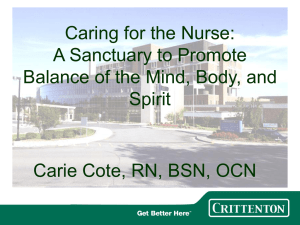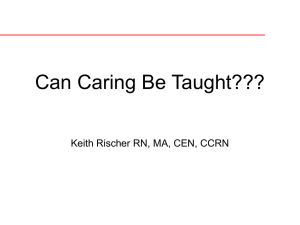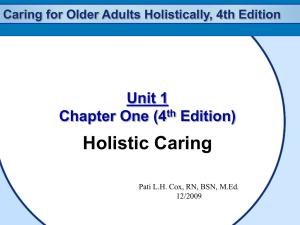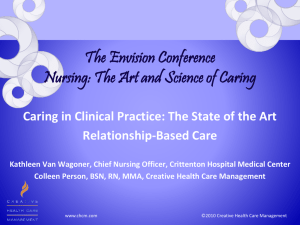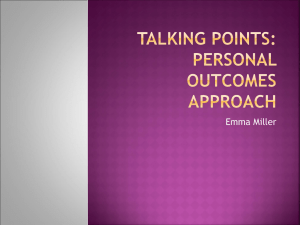Implementing Relationship Based Care
advertisement
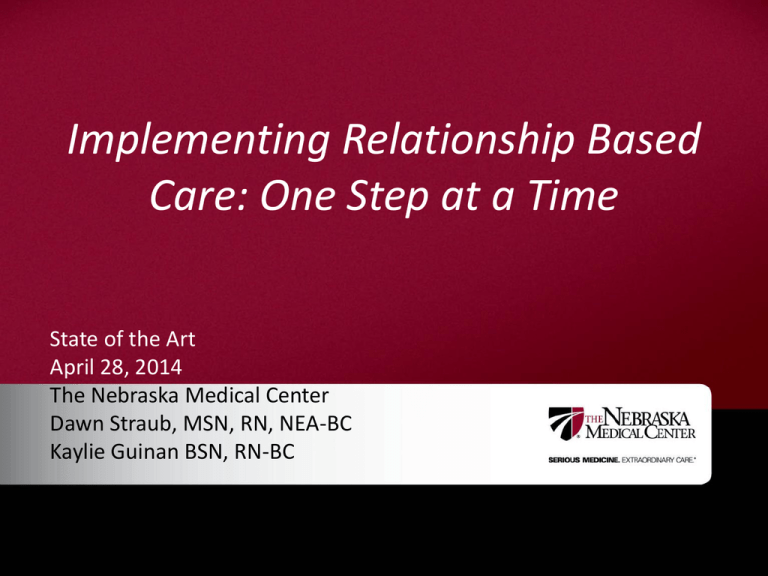
Implementing Relationship Based Care: One Step at a Time State of the Art April 28, 2014 The Nebraska Medical Center Dawn Straub, MSN, RN, NEA-BC Kaylie Guinan BSN, RN-BC Objectives • Participants will learn how a care delivery model can be implemented and become central to the practice of caring for patients and family, caring for colleagues and caring for self • Participants will discuss methods to hardwire aspects of a care delivery model into daily practice • Participants will take away ideas for how to care for themselves The Heart of the Matter Break into groups and each tell a story Please share a story of patient care that was especially meaningful to you. How did you contribute to the successful outcome? 3 History • Blended Primary Nursing and Patient-Focused Care • Magnet Site Visit in 2007 • Primary Nursing was the Care Delivery Model • Staff could state “Primary Nursing” but could not articulate what it meant 4 Nursing Strategic Plan • • • • • • 5 Fall of 2009 Adopted mission and values for nursing Created new vision for nursing Adopted Jean Watson’s Caring Theory Adopted Relationship Based Care Model Developed tactical plans for 2010-2013 Why RBC? • • • • • • • 7 Endorsed by Jean Watson Aligned with Pillars of Excellence Aligned with current practice Aligned with “Patient First” Aligned with Magnet Program concepts Ease of implementation & ability to “speak to it” Resources available to help guide implementation What is RBC? Foundation: • Relationship between nurses and patients/families is a sacred, privileged trust • Values of caring, advocacy, collaboration, safety, and seeking what is in the best interest of those we serve • 3 Crucial Care Provider Relationships: – Patients/families – Self – Colleagues 8 9 RBC Course of Events Implement Reflective Practice Cycle Model Selection Literature Search 10 • Discover • Dream • Dialogue • Design Design Infrastructure and Develop Measures of Success • Education • Design • Measure Related Evidence • Patient involvement and confidence in care increases with positive relationships with care providers • Patient safety is most effectively safeguarded when an advocate in the health care system knows them and what matters to them • Organizations with caring and healing environments and a focus on relationships have higher patient, staff, and physician satisfaction and higher productivity 11 Reflective Practice Cycle Discover • Appreciate and affirm “What Is” Dream • Future vision “Desired Future” Dialogue • “What will it take?” Design • Intention “What will be” 12 Discover • • • • Spring 2010 Focus on care of Patients/Families Representatives from all UBCs Appreciative assessment – Split into groups – Storytelling based on questions – Each member of the group tells a story – Document themes and report out 13 Themes Patient Care: Please share a story of patient care that was especially meaningful to you. How did you contribute to the successful outcome? • • • • • • • • 14 Communication Education Teamwork Trust Bonding Caring – extraordinary Continuity of Care Communication • Ability to listen • Family involvement • Follow-up • Personalizing care • Intuition • Caring as a priority of your day • Teamwork • Connecting with patient and family Themes Professional Competencies: Share an example of professional competencies that had a significant impact on a patient outcome in your unit/department. • • • • • • • • • • • 15 Listening Humility Trust Assessment Experience Assertiveness Competence Critical Thinking Confidence Advocating Intuition • • • • • • • • • Persistence Relationships with different disciplines Education Accountability Experience/expertise Advocacy Respect/value Being able to ask questions (inquiry) Technical skills Themes Teamwork: Describe a time when you were part of or observed an extraordinary display of cooperation or teamwork. What were the behaviors that made it possible? • • • • • • • • • • 16 Anticipation of coworker situation/needs Timing of response Taking initiative Competence/trust Knowing role Communication Patient first Teamwork between units Coordinating Care Being prepared • • • • • • • • • • Advocating Problem solving/critical thinking Respect for all team members Communication Assertiveness Knowledgeable Cooperation Coordination Focused on best patient outcome Delegation Dream • Reviewed themes from Discover session – Best patient care – Professional competencies present – Teamwork Visioning • Treat patient and family like our own • All providers sending same message of “we are here for the patients” 17 Dialogue • What will it take? • How much of the theory that we shared with you is needed for all staff—in order for them to understand & speak to it? • What process of education of all staff would be most effective & drive home the point of relationships? • How do we sustain RBC? How do we keep it in the forefront of all that we do? 18 Design • Unit specific roll out • Attended UBC and Staff meetings – Discussed care delivery model dimensions and focus – Linked all initiatives • Caring Connection • Patient First • NDNQI Nurse Sensitive Indicators and RN Satisfaction 19 Hardwire for Sustainability • Leadership Development – Report out of work to date – Discussion of leadership expectations • Storytelling – Agenda templates – Stories at Employee Forums • Patient Focused Goals – Documented every shift on white board – Moved into electronic care plan 20 21 Next Phase • A tenured nurse openly discussed her issues with post-traumatic stress syndrome • Other staff started discussing concerns related to stress • Decided to use “care of self” dimension of RBC to address • Began development of this dimension 22 2012 • • • • 23 One Chart hiatus Focus shifted to RBC: Care of Self UBC’s, share self stories Video shown at forum and on nursing homepage 2013 Formal Education 24 Informal Education 25 Thinking outside the box 26 Outcomes • 60 attend Healing the Healer: Care of Self (with follow up reminder) • 145 attend Self Care Express in-service • 45 Care of Self for floors education • 150 x 2 Nurse Residents a year • 68 attended Nursing Grand Rounds • 60 Self Study Modules • 180 Self Care Bingo participants (with follow up reminder) • 108 Care of Peer Bingo participants (with follow up reminder) • 300 self-care kits 27 Future plans • 2014 Move to care of Peers 28 Final Thoughts Questions? 29 Thank you!


